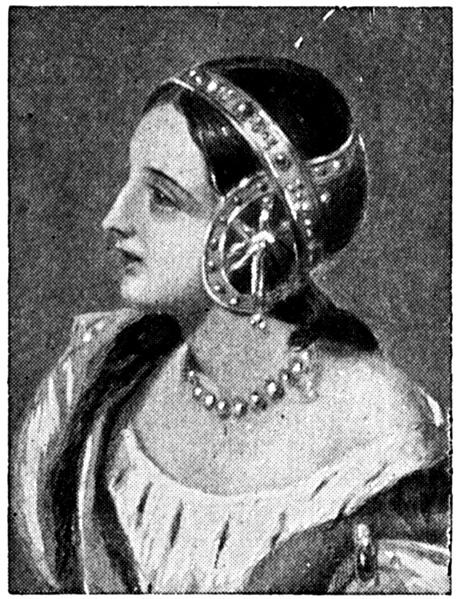Isabella of France (c.1295 - 1358)
Isabella of France, known as the She-Wolf of France, was the Queen consort of Edward II of England. She was a member of the House of Capet. Isabella was born in Paris sometime between 1288 and 1296, the daughter of King Philip IV of France and Queen Jeanne of Navarre. While still an infant, her father had promised her in marriage to Edward II to resolve the conflicts between France and England over the latter's possession of Gascony and claims to Anjou, Normandy and Aquitaine. She married Edward at Boulogne-sur-Mer on January 25 1308. At the time of her marriage Isabella was about twelve, described by Geoffrey of Paris as "the beauty of beauties...in the kingdom if not in all Europe." This may not merely have been a chronicler's politeness, as Isabella's father and brother were likewise very handsome men. Despite her youth and beauty, King Edward paid little attention to his bride, bestowing her wedding gifts upon his favorite, Piers Gaveston. Edward and Isabella produced four children, and she suffered at least one miscarriage. Although Isabella produced four children, the king was notorious for lavishing sexual attention on a succession of male favourites, including Piers Gaveston and Hugh le Despenser the younger. He neglected Isabella, once even abandoning her during a campaign against the Scottish King, Robert Bruce. While Queen Isabella's relationship to Roger Mortimer is unknown for this time period, she may have helped him escape from the Tower of London in 1323. Later she would openly take Mortimer as her lover. When her brother, King Charles IV of France, seized Edward's French possessions in 1325, she returned to France, initially as a delegate of the King charged with negotiating a peace treaty between the two countries. However, her presence in France became a focal point for the many nobles opposed to Edward's reign and she gathered an army to oppose Edward, in alliance with Roger Mortimer, 1st Earl of March, who had become her lover. Enraged by this, Edward demanded that Isabella return to England. Her brother, King Charles, replied, "The queen has come of her own will and may freely return if she wishes. But if she prefers to remain here, she is my sister and I refuse to expel her." On September 21 1326 Isabella and Mortimer landed in Suffolk with an army (most of whom were mercenaries). King Edward offered a reward for their deaths, and is rumoured to have even carried a knife in his hose with which to kill his wife. The invasion by Isabella and Mortimer was successful: King Edward's few allies deserted him without a battle; the Despensers were killed, and Edward himself was captured and forced to abdicate in favour of his eldest son, Edward III of England. Since the young king was only fourteen when he was crowned, Isabella and Mortimer ruled as regents in his place. When Edward III attained his majority (at the age of 18) he, and a few trusted companions, staged a coup on October 19 1330 and had both Isabella and Mortimer taken prisoner. Despite Isabella's cries of "Fair son, have pity on gentle Mortimer", Mortimer was executed for treason one month later. Isabella's life was spared by her son and she was allowed to retire to Castle Rising in Norfolk. Isabella took the habit of the Poor Clares before she died on August 22, 1358, and her body was returned to London for burial at the Franciscan church at Newgate. She was buried in her wedding dress, with Edward's heart interred with her. |
|
